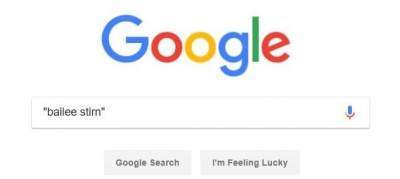Difference between revisions of "Bailee Stirn"
| Line 1: | Line 1: | ||
| − | Before being prompted to search myself online I had never thought much about the uniqueness of my name. In fact, ever since I left my hometown for college it feels like everywhere I go there is someone else around my age named Bailee or Bailey or something of the sort. When faced with googling myself, however, I was lucky enough, or perhaps unlucky depending on how you see it, to find that the combination of the spelling of my first and last [[File:Bailee_Stirn-google.JPG|400px|thumb|right|]]name provides me with narrow results all specific to my real life. When realizing this I was at first pleasantly surprised because that meant I did not have to work as hard to find results actually about me and anyone else searching me would not confuse things for someone else. On further thought, however, I became slightly more nervous, wishing for there to be hundreds of other Bailee Stirns out there to be confused with me so that no one will be able to tell what data is mine. My brainstorming immediately hoped for a means for obfuscation when it came to online profiles, something entailing making various fake facts associated with my name so as to hide the truth, but I realized that | + | Before being prompted to search myself online I had never thought much about the uniqueness of my name. In fact, ever since I left my hometown for college it feels like everywhere I go there is someone else around my age named Bailee or Bailey or something of the sort. When faced with googling myself, however, I was lucky enough, or perhaps unlucky depending on how you see it, to find that the combination of the spelling of my first and last [[File:Bailee_Stirn-google.JPG|400px|thumb|right|]]name provides me with narrow results all specific to my real life. When realizing this I was at first pleasantly surprised because that meant I did not have to work as hard to find results actually about me and anyone else searching me would not confuse things for someone else. On further thought, however, I became slightly more nervous, wishing for there to be hundreds of other Bailee Stirns out there to be confused with me so that no one will be able to tell what data is mine. My brainstorming immediately hoped for a means for obfuscation when it came to online profiles, something entailing making various fake facts associated with my name so as to hide the truth, but I realized that this would not really address the root of the privacy and ethical concerns here. |
In Dean Cocking's ''Plural Selves'', he writes that privacy depends on one's control over self-presentation, so a simpler solution might be policies allowing people to take things off websites about themselves. Unfortunately, there are not many tools in place in the U.S. for that and there is the issue of deciding what can and cannot be withheld from the public. So for now, I may continue to be associated with any and all online results for "Bailee Stirn", no matter what they are or what patterns they represent. | In Dean Cocking's ''Plural Selves'', he writes that privacy depends on one's control over self-presentation, so a simpler solution might be policies allowing people to take things off websites about themselves. Unfortunately, there are not many tools in place in the U.S. for that and there is the issue of deciding what can and cannot be withheld from the public. So for now, I may continue to be associated with any and all online results for "Bailee Stirn", no matter what they are or what patterns they represent. | ||
Revision as of 20:04, 15 February 2019
Before being prompted to search myself online I had never thought much about the uniqueness of my name. In fact, ever since I left my hometown for college it feels like everywhere I go there is someone else around my age named Bailee or Bailey or something of the sort. When faced with googling myself, however, I was lucky enough, or perhaps unlucky depending on how you see it, to find that the combination of the spelling of my first and last name provides me with narrow results all specific to my real life. When realizing this I was at first pleasantly surprised because that meant I did not have to work as hard to find results actually about me and anyone else searching me would not confuse things for someone else. On further thought, however, I became slightly more nervous, wishing for there to be hundreds of other Bailee Stirns out there to be confused with me so that no one will be able to tell what data is mine. My brainstorming immediately hoped for a means for obfuscation when it came to online profiles, something entailing making various fake facts associated with my name so as to hide the truth, but I realized that this would not really address the root of the privacy and ethical concerns here.In Dean Cocking's Plural Selves, he writes that privacy depends on one's control over self-presentation, so a simpler solution might be policies allowing people to take things off websites about themselves. Unfortunately, there are not many tools in place in the U.S. for that and there is the issue of deciding what can and cannot be withheld from the public. So for now, I may continue to be associated with any and all online results for "Bailee Stirn", no matter what they are or what patterns they represent.
Ultimately, I found that my online identity is built on the idea David Shoemaker discusses in Self-exposure and exposure of the self where individual results suggest patterns both significant and irrelevant to my self-identity. Further, although many aspects of my self-identity are being presented accurately, they have stolen my chance to present them in my own way, suggesting a serious lack of informational privacy.
Contents
Google Search
The results from a google search of my name mainly fell into four categories: middle school and high school sports and clubs, academic pursuits, social media, and logistical information. The first category included various websites containing statistics, action pictures, awards, and newspaper appearances for games and other community events I participated in through student organizations. The second category included articles about my academic achievements from high school and different assignments I have created both in high school and college on public websites like Prezi and Vimeo. The third category included the only two online profiles I have associated with my name which are for Twitter and Pinterest. Finally, the rest of the search results contained information about me such as my address, sex, birth year, and relatives- all of which were accurate.
Data Broker
Another level added to the formation of online identities is data brokers holding all kinds of information on individuals, usually found behind a paywall. When using Instant Checkmate, one such data broker, to search my name, facts such as my exact birth date, all members of my immediate family, my pinterest account, my address, my neighbors and some of their personal data, sex offenders in the area, and possible associates (whatever that means) were available. Everything that Instant Checkmate's report on me included was correct, except the category of possible associates, which subsequently gave me the most concern in my uncertainty. It said that a possible associate of mine was a person with a name I do not recognize and under his list of previous addresses, was that of my family's home. I know this is untrue because my family built our home when I was young on property that was family owned, giving it a brand new address. It makes sense that these reports would often have mistakes such as this, however, I am still labeled as an associate of this person unknown to me for anyone who chooses to see.
Patterns
When they get it right
Growing up in a very small town, I made peace many years ago with the fact that my privacy in the sense of the control I had over what was published about me, was minimal. Choosing to participate in many community-based affairs, I knew that I had been featured in numerous local newspaper articles and was therefore not surprised to find any of these results in the first three categories. Of course, that does not mean that I am not embarrassed by some of it, especially pictures like the one to the right. But because I had adjusted my life to expect these things many years ago, I found myself not as distraught at first glance to find it publicly available. In addition, they are all showing things that I continue to contribute to my self-identity and am generally proud of like being involved in a community or striving academically, so I ask myself should I really get to complain? I am still unsure of how wronged I ultimately feel, however, there is something to be said about my lack of ability in presenting these things on my own time, in my own manner. For example, sharing my successes and failures in playing sports and how this has become a part of my self-identity to some people would feel comfortable, but doing so to others might not be, or I might only want to reveal the successes. While this may be a relatively low stakes example, the privacy implications are still there and important to acknowledge for when the case has bigger consequences.One piece of information where at first glance I was slightly more concerned by the accuracy was my address. According to Shoemaker, the "domain of informational privacy, the zone to be protected, is information about one’s self-identity", and for me, this includes where I grew up (11). This is also something where having control over its presentation would be important to me, as a further search on the town in my available address might offer half of the picture with subsequent biases. For example, details such as the population is around 1,500, the median household income is less than $40,000, and the unemployment rate is around 10% might create an image of my background or the town that is not everything I would want someone to consider. However, I have no control over this with the presentation of my address taken out of my hands.
When they get it wrong
As I mentioned before, the only aspect of my online data identity that I found to be incorrect was the mysterious appearance of an unknown person listed as my associate. Using Shoemaker's domain for informational privacy, I include my family and friends who have a role in my self-identity. The false connection to this stranger then feels like a breach of my privacy. Even though I know nothing about this person, I am still connected to his online data identity. Not only do I have to worry about what information is available on me, I also have to worry about whatever this other person has out there. Now, I realize that becoming paranoid over this would be an over reaction, however, it proves to show that false data like this built into an online identity is not only a breach of privacy but it also could have consequences on your life outside of your control.

